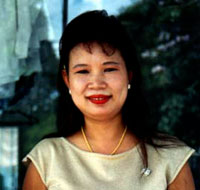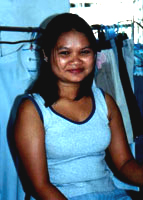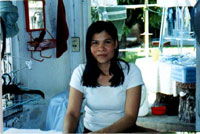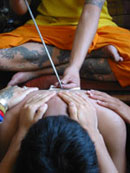Talking About A Laundry Business
Juthaporn has been the owner of a small and busy laundry business for the last five years. She is 41 years old, speaks excellent English and has never traveled outside of Thailand. She attended a business college and then worked as an accountant for many years before going into the dressmaking business. Then she decided to open up her laundry shop.
When asked about the growth of her business she told me, “When we first opened, business was slow but it keeps growing. Sometimes we are busy but if there is a month with many holidays, I lose money because everyone leaves Bangkok and goes to the countryside. My store is closed every Sunday. Other stores stay open. The women that work for me have families. I want them to enjoy Sundays.”
Inside the very hot store where we stood chatting there were three industrious women ironing away. It turns out all three women come from Isaan, Thailand’s northeast and its poorest region. Juthaporn told me, “I like people from the northeast. They work hard and they learn very quickly.” One of the women has been working for her since the doors opened and earns 5,000 baht (111 US Dollars) per month. The second woman earns 4,000 baht (89 US Dollars) a month. The newcomer who has only been working at the store for two months earns 2,000 baht (44 US Dollars) per month and is paid 6 baht (13 US cents) for each shirt she irons. There is no official payday. “I give the women money when they need it. They are very poor. All of the women have children. One is divorced and two are married. One husband is a soldier and one husband is a motorcycle messenger,” she stated. Her employees were at ease around her and I think she is a kind boss.
northeast. They work hard and they learn very quickly.” One of the women has been working for her since the doors opened and earns 5,000 baht (111 US Dollars) per month. The second woman earns 4,000 baht (89 US Dollars) a month. The newcomer who has only been working at the store for two months earns 2,000 baht (44 US Dollars) per month and is paid 6 baht (13 US cents) for each shirt she irons. There is no official payday. “I give the women money when they need it. They are very poor. All of the women have children. One is divorced and two are married. One husband is a soldier and one husband is a motorcycle messenger,” she stated. Her employees were at ease around her and I think she is a kind boss.
Juthaporn pays 10,000 baht (222 US Dollars) a month for rent including water and electricity for her store. The dryer is only used on days when there is not enough sun but at no additional charge to the customer.
To wash, dry and iron one article costs 15 baht (33 US cents). To dry clean a pair of pants costs 60 baht (1.30 US Dollars). However, ‘dry cleaning’ has a different definition from expected. The clothes are hand washed in water with a ‘Woolite’ type of detergent. When asked about this method she explained, “The customers don’t want to pay for chemical dry cleaning. It is too expensive and my store is too small to do it.” Laundry takes three days from delivery until it is ready to pick up.
US cents). To dry clean a pair of pants costs 60 baht (1.30 US Dollars). However, ‘dry cleaning’ has a different definition from expected. The clothes are hand washed in water with a ‘Woolite’ type of detergent. When asked about this method she explained, “The customers don’t want to pay for chemical dry cleaning. It is too expensive and my store is too small to do it.” Laundry takes three days from delivery until it is ready to pick up.
She makes roughly 27,000 baht (600 US Dollars) per month profit. Doors open at 8:30 a.m. and close at 7 p.m. Judging by the large quantity of laundry I saw, business has been going quite well. Juthaporn has no plans for changing her job in the future. She lives with her mother and father and is divorced with no children. “That is how we do it in Thailand,” she said. When asked about her house, she responded, “We have everything. Air conditioning, TV, VCR, stereo, everything.”
During her free time she enjoys, “Shopping. I used to make dresses so I am very interested in fashion. On Sunday I clean the house in the morning and then I take my parents to lunch. We like all kinds of food: Spanish, Italian, German, Thai, just everything. I don’t eat meat, though. I haven’t for four years.” During vacation time she enjoys traveling in Thailand either to Chiang Mai or to the beach. “I like to be on the ocean. I like to sit in the sun but only for a little while.”
to make dresses so I am very interested in fashion. On Sunday I clean the house in the morning and then I take my parents to lunch. We like all kinds of food: Spanish, Italian, German, Thai, just everything. I don’t eat meat, though. I haven’t for four years.” During vacation time she enjoys traveling in Thailand either to Chiang Mai or to the beach. “I like to be on the ocean. I like to sit in the sun but only for a little while.”
When asked what she would do if hypothetically given 5,000 baht (111 US Dollars) she said, “Give it away a little bit at a time to poor people who need it. Give some to the monks. I would make ‘tamboon.’” Tamboon means make merit and includes making donations, feeding monks and worshipping at the temple.
When asked what the biggest problem facing her country is, Juthaporn replied, “Poverty. People want a job but they can’t find one. People want to earn money and cannot.”
Her opinion on foreigners living in Thailand is: “I like them. Americans are my favourite. I think they are the closest to Thais in their kindness and understanding. I have an American friend in Colorado. I like Italians and Germans, too.” She was happy to practice her English with me and I found her to be an open and friendly person.
When asked if the store washes undergarments or socks she emphatically stated, “No!” I then asked her what she would do if given some to wash. “Well, if I don’t see them when the customers bring them in then I have to wash them. If someone asks me first, I will tell them no.”
